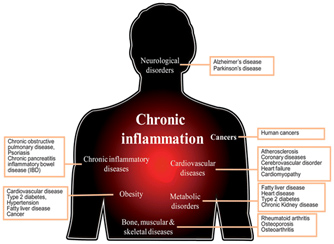Chronic Inflammation and Disease

Since chronic inflammation has been associated through clinical trials to be associated with obesity, cardiovascular disease, neurodegenerative disease like Alzheimer’s Disease, Parkinson’s disease, and multiple sclerosis, diabetes, aging, and cancers, let’s take a deeper look at how inflammation plays a role in the development and promotion of these diseases and how our food may be the primary answer to limiting this inflammation.

In cardiovascular disease inflammatory markers are thought to convert LDL-cholesterol into oxidized LDL-cholesterol which is more likely to form plaque as well as to insult the delicate surface of the endothelium which generates more inflammation and more damage. In neurodegenerative diseases like Parkinson’s disease, Alzheimer’s Disease, and multiple sclerosis certain inflammatory processes may be responsible for causing neuron damage and causing vital cells for proper cognitive function to be damaged beyond repair. In obesity, the fastest growing disease state in the United States, inflammation plays a double role. Our abdominal fat tissue is considered to be an endocrine organ, meaning that it makes and secretes hormones including additional inflammatory markers which perpetuate the problem. These additional inflammatory markers affect insulin resistance and blood sugar control, risk for cardiovascular disease, hypertension, and particular types of cancer. Inflammation is intimately associated with other metabolic disorders including fatty liver disease, type 2 diabetes, and chronic kidney disease through various pathways including blood sugar regulation and fat deposition pathways. Inflammatory markers play a role in the development of rheumatoid arthritis and osteoporosis disease through a handful of inflammatory markers that produce substances that can destroy bone and cartilage. Other diseases are frequently associated with inflammatory cells including psoriasis, chronic pancreatitis, inflammatory bowel disease, and chronic obstructive pulmonary disease (COPD). Many researchers now believe that chronic inflammation is a necessary condition for the growth and maintenance of many types of cancer by fueling the supply of blood to the tumor which increases its ability to utilize the body’s nutrients.
How Flavonoids Protect
Flavonoids are a classification of more than 2000 active compounds that are native to certain fruits, vegetables, nuts, seeds, and plants. It is estimated that on average we consume a few hundred milligrams to 650 mg per day in our diets. The graphic below does an excellent job of demonstrating how particular nutrients found in food are known to be beneficial in various areas of our bodies.
Form & Function of Flavonoids
| Category | Name of Compound | Naturally Found In | Benefits in the Body |
| Flavones | Apigenin | Parsley & Celery |
|
| Flavones | Luteolin | Thyme, Beets, Brussels Sprouts, Cabbage & Cauliflower |
|
| Flavones | Tangeretin | Citrus Peel |
|
| Flavones | Nobiletin | Citrus Peel |
|
| Flavonols | Quercetin | Onions, Broccoli, Apples, Grapes, Wine, Tea, & Leafy Green Veggies |
|
| Flavonols | Kaempferol | Broccoli & Tea |
|
| Flavanols | EGCG (epigallocatechin-3-gallate) | Tea |
|
| Flavanones | Naringenin | Citrus Peel |
|
| Anthocyanidins | Cyanidin, Thioredoxin | Red and blue pigments (e.g. blueberries/grapes) |
|
| Anthocyanidins | Delphinidin | Red and blue pigments (e.g. blueberries/grapes) |
|
| Tannins | Grape Seed proanthocyanidin (GSP) | Fruits, Grains, Berries, Beans, Nuts, Cocoa, Wine |
|
| Tannins | Theaflavins | Black Tea |
|
This post has been, for the most part, a simplified summary of the following paper published in Food & Function with free online access. If you want more information or a detailed biochemistry of these benefits of flavonoids please refer to the hyperlink below. After a free subscription this 16 page pdf is free to download.
Pan, M.H., Lai, C.S, & Ho, C.T. (July 30, 2010). Anti-Inflammatory Activity of Natural Dietary Flavonoids. Retrieved from: http://pubs.rsc.org/en/content/articlelanding/2010/fo/c0fo00103a/unauth#!divAbstract.
Dallas
3800 San Jacinto
Dallas, TX 75204
(214) 827-8777
Driving DirectionsHours:
Monday, Wednesday,
Friday: 8:00 a.m. - 11:00 a.m.
Tuesday: 4:00 p.m. - 7:00 p.m.Grapevine
823 Ira E. Woods Avenue
Grapevine, TX 76051
(214) 827-8777
Driving DirectionsHours:
Thursday: 1:30 p.m. - 5:00 p.m.






